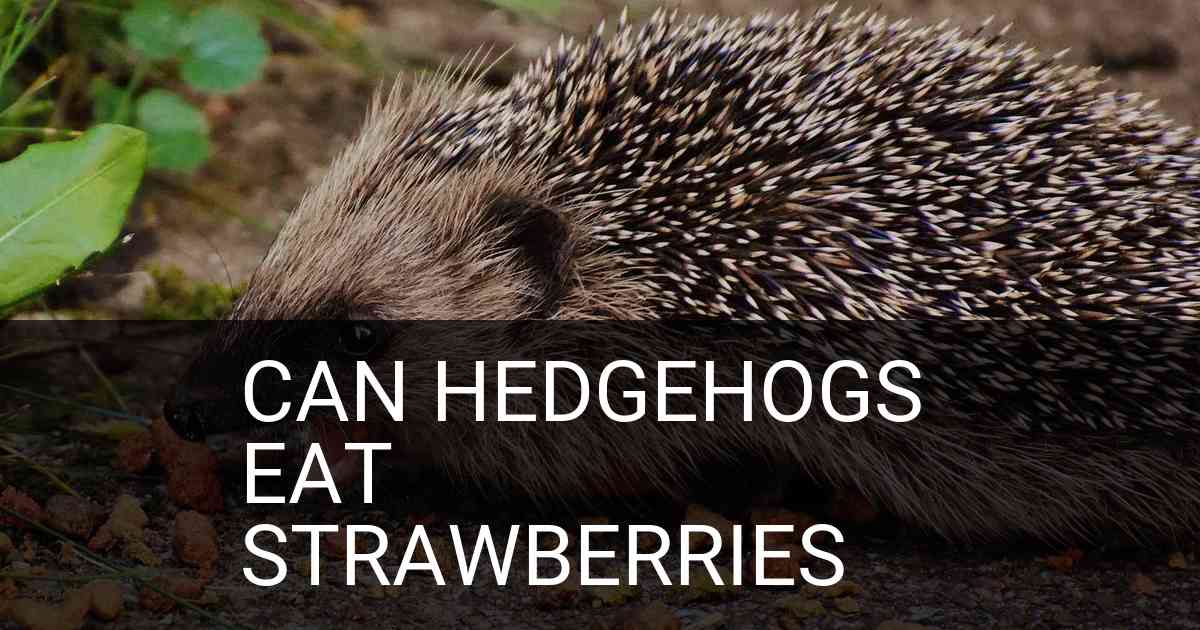
Welcome to the ultimate guide on whether hedgehogs can eat strawberries. In this article, we will discuss what a hedgehog diet is composed of and provide insight into whether strawberries are an integral part of that diet or not. We’ll also take a look at the potential health benefits and risks associated with feeding these sweet treats to your pet hedgehog. So if you’re curious about adding strawberries to your pet’s diet, read on!
Can Hedgehogs Eat Strawberries?
The short answer is yes, hedgehogs can eat strawberries. However, like any other food item, you should feed them in moderation and as a special treat. These sweet treats are actually quite nutritious for your pet hedgehog and can provide them with essential vitamins and minerals. That being said, it’s important to note that strawberries should never be the main part of their diet.
Health Benefits of Feeding Your Hedgehog Strawberries
- Vitamins: Strawberries contain an array of vitamins including Vitamin C, which helps boost your pet’s immune system; B-complex vitamins, which help regulate metabolism and energy levels; and Vitamin K which helps with blood clotting.
- Minerals: Strawberries also contain various minerals such as potassium which helps regulate fluid balance in the body; magnesium that keeps muscles functioning properly; iron to prevent anemia; calcium for strong bones and teeth; and phosphorus to maintain healthy cells.
- Antioxidants: Antioxidants found in strawberries have been linked to reducing inflammation in the body as well as fighting off free radicals that could potentially cause health problems.
Types of Fruits Safe for Hedgehogs to Eat
Fruits are an important part of a healthy and balanced diet for hedgehogs. A variety of fruits can provide essential vitamins, minerals, and fiber that can help keep your pet happy and healthy. Here is a list of some safe fruits that you can feed your hedgehog:
- Apples: Apples are a great fruit option for hedgehogs as they contain vitamin C, dietary fiber, and antioxidants. Be sure to remove the seeds before feeding them to your pet.
- Bananas: Bananas are another great choice as they contain potassium, magnesium, zinc, iron, vitamin B6 and other essential nutrients. Just be sure to cut them into small pieces so they don’t choke on it.
- Blueberries: Blueberries are packed with antioxidants that can help improve immunity in hedgehogs. They also have anti-inflammatory properties which may help reduce inflammation in their bodies.
- Strawberries: Strawberries are rich in Vitamin C which helps boost the immune system. They also contain folate which aids in cell growth and repair.
- Raspberries: Raspberries offer several health benefits including assisting with digestion due to its high fiber content. Additionally, it contains Vitamin C which supports immunity.
- Papaya: Papaya provides a good source of Vitamin E as well as carotenoids like beta-carotene which has antioxidant effects.
Types of Fruits Hedgehogs Enjoy
Hedgehogs are omnivores, meaning they enjoy both plant-based and animal-based foods. This includes fruits! They can eat a variety of different fruits, which makes for an exciting diet. Here’s a look at some of the best types of fruits hedgehogs love to snack on:
Apples
Apples are one of the most popular fruits that hedgehogs enjoy eating. Apples provide essential vitamins and minerals such as vitamin C, dietary fiber, and potassium.
Bananas
Bananas are another great source of nutrients for your pet hedgehog. Bananas contain magnesium, manganese, copper, iron, vitamins B6 & C and dietary fiber.
Berries
Berries make a great treat for your pet hedgehog! Berries like strawberries and blueberries provide plenty of antioxidants and other important vitamins.
Cherries:
Cherries may also be enjoyed by your pet hedgehog in moderation. Cherries have many beneficial nutritional compounds including Vitamin A and C along with phenolic compounds which act as antioxidants.
Do Wild Hedgehogs Enjoy Eating Strawberries?
Wild hedgehogs are omnivorous animals, meaning they eat both plants and small insects. While the majority of their diet consists of invertebrates such as caterpillars, earthworms, beetles, and snails, wild hedgehogs will also occasionally consume fruit. One popular option for these wild critters is strawberries!
The Benefits of Feeding Strawberries to Wild Hedgehogs
Strawberries are a great treat for wild hedgehog visitors because they provide essential nutrients in a tasty package. They contain vitamin C which helps support healthy skin and fur growth. Additionally, they offer an excellent source of fiber that can help with digestion.
Feeding wild hedgehogs strawberries can be beneficial not just nutritionally but also socially. Providing them with treats encourages them to return regularly to your garden or yard and strengthens the bond between you and the animal.
How To Serve Strawberries To Your Wild Hedgehog Visitors:
- Pick Fresh Berries – Make sure any berries you feed your visitor are ripe but still firm enough that they won’t squish when handled. Soft or overly ripe berries may cause digestive issues if eaten by the hedgehog.
- Cut Large Berries In Half – If you’re serving large strawberries cut them into halves so it’s easier for the hedgehog to eat. This prevents choking hazards.
- Leave Some Out At Night – One way to attract more wildlife is to leave some fresh fruit out at night before going inside. If there’s food readily available when nocturnal animals like hedghogs come out looking for dinner then chances increase that you’ll have regular visitors from this species.
- Don’t Overfeed Them – It’s important not to overfeed your wild visitors as too much food can lead to obesity and other health issues in these creatures.
Conclusion
In conclusion, although strawberries are not a natural part of the hedgehog diet in the wild, they can be included as an occasional treat. However, it is important to note that too much strawberry can lead to digestive problems and potential health risks for your pet hedgehog. As always, moderation and proper veterinary advice should be followed when introducing any new food into your pet’s diet.

